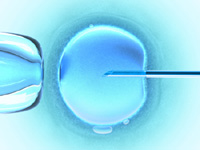Male InfertilityIn about 40% of infertile couples, the problem is a male factor and in about 40% it is a female one, and for the remaining 20% it seems to be a joint factor or the cause is unknown. When a man finds out he is infertile, it often is completely unexpected and it can have a great emotional impact on his overall well-being. Causes of Male Infertility
The following are know Male Infertility Causes: Sperm Production Problems: This occurs when low numbers of sperm are made and/or the sperm that are made do not work properly. A number of factors can disrupt the production of sperm including undescended testis, infections or radiation damage. About two thirds of infertile men have sperm production problems, making it the most common cause of male infertility. Blockage if Sperm Transport: Blockage in the tubes leading sperm away from the testes to the penis can cause a complete lack of sperm in the ejaculation of semen. This is the second most common cause of male infertility and affects about three in every 20 infertile men. Sperm antibodies: Sperm antibodies can develop, which can lessen sperm movement and block egg binding during fertilization. About one in every 16 infertile men has sperm antibodies. Sexual problems: Difficulties with sexual intercourse, such as erection or ejaculation problems, can also prevent couples from becoming pregnant. Sexual problems are not a common cause of infertility and affect less than one in 100 infertile men. Hormonal Problems: Sometimes the pituitary gland, located underneath the brain, does not send the right messages to the testes. This can cause low testosterone levels, which means that sperm are not produced. Hormonal causes are uncommon, and affect less than one in 100 infertile men. Anabolic (androgenic) steroid abuse by body builders can shut off the hormones from the pituitary and lead to low sperm counts. Cause Unknown/Idiopathic Infertility: There are still gaps in our knowledge and for 40% of men with infertility the cause of the problem is unknown. This is called ‘idiopathic infertility' or ‘cause unknown'. Reference: de Kretser DAO, Andology Australia, 2005, Male Infertility. [Online]. Available: http://www.andrologyaustralia.org/library/MaleInfertility_FactSheet.pdf Possible Solutions for Male InfertilityA range of solutions are available to treat specific causes of male infertility. Surgery: In men, surgery may be required to remove any blockage in the vas deferens or epididymis (the tubes), or repair a varicocele. A varicocele is an unnatural swelling of the veins in the scrotum. Fertility Drugs: Sperm production is a result of a well-balanced endocrine system (pituitary, hypothalamus, and gonads). However, some men have hormone irregularities that may interfere with the process of sperm production. Medications can assist with producing hormones for sperm production and erectile dysfunction. Assisted Reproductive Technologies:In some cases, the doctor will recommend that the couple seek assisted reproductive technologies in order to become pregnant. However, it is important to remember that these techniques do not cure or treat the cause of male infertility, but they can help couples conceive even if the man's sperm count is very low.
If a couple proceeds with ICSI/IVF, it should be remembered that these assisted reproductive technologies expose women to risk such as those associated with surgical collection of eggs, and switches the focus from the man to the woman. Donor Sperm: Male infertility is completely untreatable when the man has no sperm in his semen or in the testes, because the sperm producing cells in the testes either did not develop or have been permanently destroyed. The only option for such couples to achieve a pregnancy is to consider a donor insemination. Other possibilities to have a family, if conception is not possible, may be:
Please contact your doctor for further details and specific medical advice and assistance in your case of infertility. Prevention of Male InfertilityYour lifestyle can have an impact on sperm production, count and quality. Leading a healthy lifestyle is important when it comes to fertility. Positive steps to improve your chances of healthy sperm and pregnancy:
Sex therapy and Relationship Counselling is available in Sydney, New South Wales (NSW) - Melbourne, Victoria (VIC) - Adalaide, South Australia (SA) - Perth, Western Australia (WA) - Darwin, Northern Territories (NT) - Hobart, Tasmania (TAS) - Brisbane, Queensland (QLD) - Canberra, Australian Capital territory (ACT) |
|
|
Copyright © 2010 – 2023 Sexual Health Australia. All Rights Reserved. Powered by Sitesuite


 In Vitro Fertilisation (IVF): This is a reproductive procedure in which a woman's eggs are removed from her body, fertilized with sperm in a laboratory, and then surgically implanted back into her uterus. In 1978, Louise Brown, the first test-tube baby was born in England, since that time thousands of babies have been conceived in this fashion.
In Vitro Fertilisation (IVF): This is a reproductive procedure in which a woman's eggs are removed from her body, fertilized with sperm in a laboratory, and then surgically implanted back into her uterus. In 1978, Louise Brown, the first test-tube baby was born in England, since that time thousands of babies have been conceived in this fashion.
